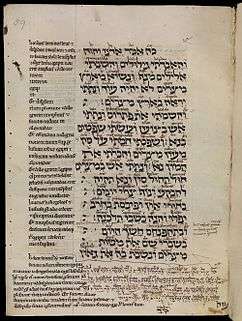Ezekiel 16
| Ezekiel 16 | |
|---|---|
 Book of Ezekiel 30:13–18 in an English manuscript from the early 13th century, MS. Bodl. Or. 62, fol. 59a. A Latin translation appears in the margins with further interlineations above the Hebrew. | |
| Book | Book of Ezekiel |
| Bible part | Old Testament |
| Order in the Bible part | 26 |
| Category | Nevi'im |
Ezekiel 16 is the sixteenth chapter of the Book of Ezekiel in the Hebrew Bible or the Old Testament of the Christian Bible. This book contains the prophecies spoken by the prophet Ezekiel, and is a part of the Books of the Prophets.[1] Clements calls this chapter "an Old Testament parable of the prodigal daughter", describing a shocking illustration eof ungrateful Jerusalem in contrast to God's enduring love to her.[2] This chapter is often linked to Ezekiel 23 which deals with two daughters, symbolizing the Kingdoms of Israel and Judah.[3]
Text
- The original text is written in Hebrew language.
- This chapter is divided into 63 verses.
Textual versions
Some most ancient manuscripts containing this chapter in Hebrew language:
- Masoretic Text (10th century)
- Dead Sea Scrolls: (2nd century BC)[4][5]
- 3Q1 (3QEzek): extant verses 31-33
Ancient translations in Koine Greek:
- Septuagint
- Theodotion version (~AD 180)
Structure
NKJV groups this chapter into:
- Ezekiel 16:1-14 = God's Love for Jerusalem
- Ezekiel 16:15-30 = Jerusalem's Harlotry
- Ezekiel 16:31-34 = Jerusalem's Adultery
- Ezekiel 16:35-43 = Jerusalem's Lovers Will Abuse Her
- Ezekiel 16:44-59 = More Wicked than Samaria and Sodom
- Ezekiel 16:60-63 = An Everlasting Covenant
Verse 2
- Son of man, cause Jerusalem to know her abominations,[6]
- "Son of man" (Hebrew: בן־אדם ḇen-'ā-ḏām): this phrase is used 93 times to address Ezekiel.[7]
- "Abomination" (Hebrew: תּוֹעֵבָה tôwʻêbah, to-ay-baw'): something loathsome or objectionable, especially for "Jehovah" (Proverbs 3:32; 21:27), "specially used for things belonging to the worship of idols" or idolatrous practices and objects.[8][9]
Verse 3
- And say, Thus saith the Lord God unto Jerusalem;
- Thy birth and thy nativity is of the land of Canaan;
- thy father was an Amorite, and thy mother an Hittite.[10]
- The assimilation of Israel with those former residents led to apostasy.[11]
Verse 6
- And when I passed by thee, and saw thee polluted in thine own blood,
- I said unto thee when thou wast in thy blood,
- Live; yea, I said unto thee when thou wast in thy blood, Live. (NKJV)[12]
- "Polluted" (Hebrew: מִתְבּוֹסֶסֶת miṯ-bō-se-seṯ, from the root verb בּוּס ḇūs, "tread down with feet" or "trample"[13][14]): Rashi connects it to (Psalm 60:12, numbered as 60:14 in Hebrew version): "God ... shall tread down (Hebrew: יָבוּס) our enemies."[15]
Verse 60
- Nevertheless I will remember my covenant with thee in the days of thy youth,
- and I will establish unto thee an everlasting covenant.[16]
This was anticipated in Leviticus 26:43-45.[11]
See also
- Related Bible parts: Genesis 14, Leviticus 26, Ezekiel 23, John 15
Notes and references
- ↑ Theodore Hiebert, et al. 1996. The New Interpreter's Bible: Volume VI. Nashville: Abingdon.
- ↑ Clements 1996, p. 67-73.
- ↑ Clements 1996, p. 70.
- ↑ Timothy A. J. Jull; Douglas J. Donahue; Magen Broshi; Emanuel Tov (1995). "Radiocarbon Dating of Scrolls and Linen Fragments from the Judean Desert". Radiocarbon. 38 (1): 14. Retrieved 26 November 2014.
- ↑ Ulrich 2010, p. 588.
- ↑ Ezekiel 16:2
- ↑ Bromiley 1995, p. 574.
- ↑ Brown, 1994 & "תּוֹעֵבָה".
- ↑ Gesenius, 1979 & "תּוֹעֵבָה".
- ↑ Ezekiel 16:3
- 1 2 The New Oxford Annotated Bible with the Apocrypha, Augmented Third Edition, New Revised Standard Version, Indexed. Michael D. Coogan, Marc Brettler, Carol A. Newsom, Editors. Publisher: Oxford University Press, USA; 2007. p. 1198-1201 Hebrew Bible. ISBN 978-0195288810
- ↑ Ezekiel 16:6
- ↑ Brown, Francis; Briggs, Charles A.; Driver, S. R. The Brown-Driver-Briggs Hebrew and English Lexicon. Hendrickson Publishers; Reprint edition (1994). ISBN 978-1565632066. "בּוּס".
- ↑ Gesenius, H. W. F. Gesenius' Hebrew and Chaldee Lexicon to the Old Testament Scriptures: Numerically Coded to Strong's Exhaustive Concordance, with an English Index. Samuel Prideaux Tregelles (Translator). Baker Book House; 7th edition. 1979. בּוּס
- ↑ Rashi's Commentary on Ezekiel 16:6.
- ↑ Ezekiel 16:60
Bibliography
- Bromiley, Geoffrey W. (1995). International Standard Bible Encyclopedia: vol. iv, Q-Z. Eerdmans.
- Brown, Francis; Briggs, Charles A.; Driver, S. R. (1994). The Brown-Driver-Briggs Hebrew and English Lexicon (reprint ed.). Hendrickson Publishers. ISBN 978-1565632066.
- Clements, Ronald E (1996). Ezekiel. Westminster John Knox Press. ISBN 9780664252724.
- Gesenius, H. W. F. (1979). Gesenius' Hebrew and Chaldee Lexicon to the Old Testament Scriptures: Numerically Coded to Strong's Exhaustive Concordance, with an English Index. Translated by Tregelles, Samuel Prideaux (7th ed.). Baker Book House.
- Joyce, Paul M. (2009). Ezekiel: A Commentary. Continuum. ISBN 9780567483614.
- Ulrich, Eugene, ed. (2010). The Biblical Qumran Scrolls: Transcriptions and Textual Variants. Brill.
External links
Jewish
Christian
This article is issued from
Wikipedia.
The text is licensed under Creative Commons - Attribution - Sharealike.
Additional terms may apply for the media files.